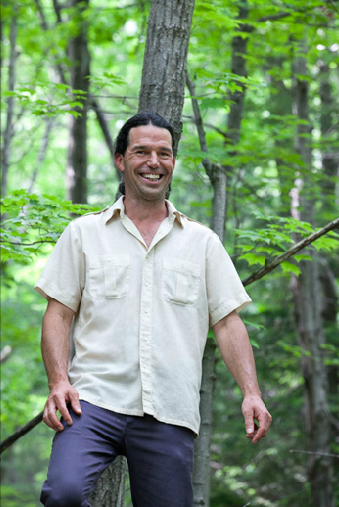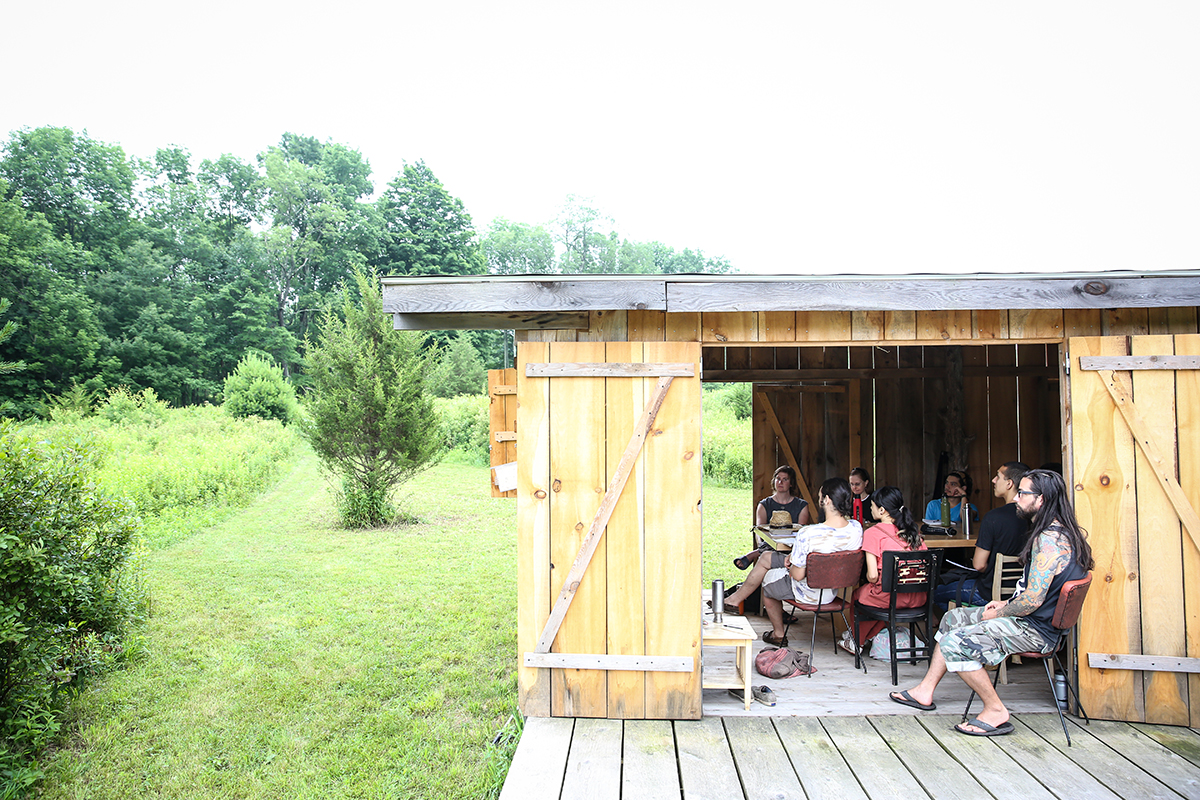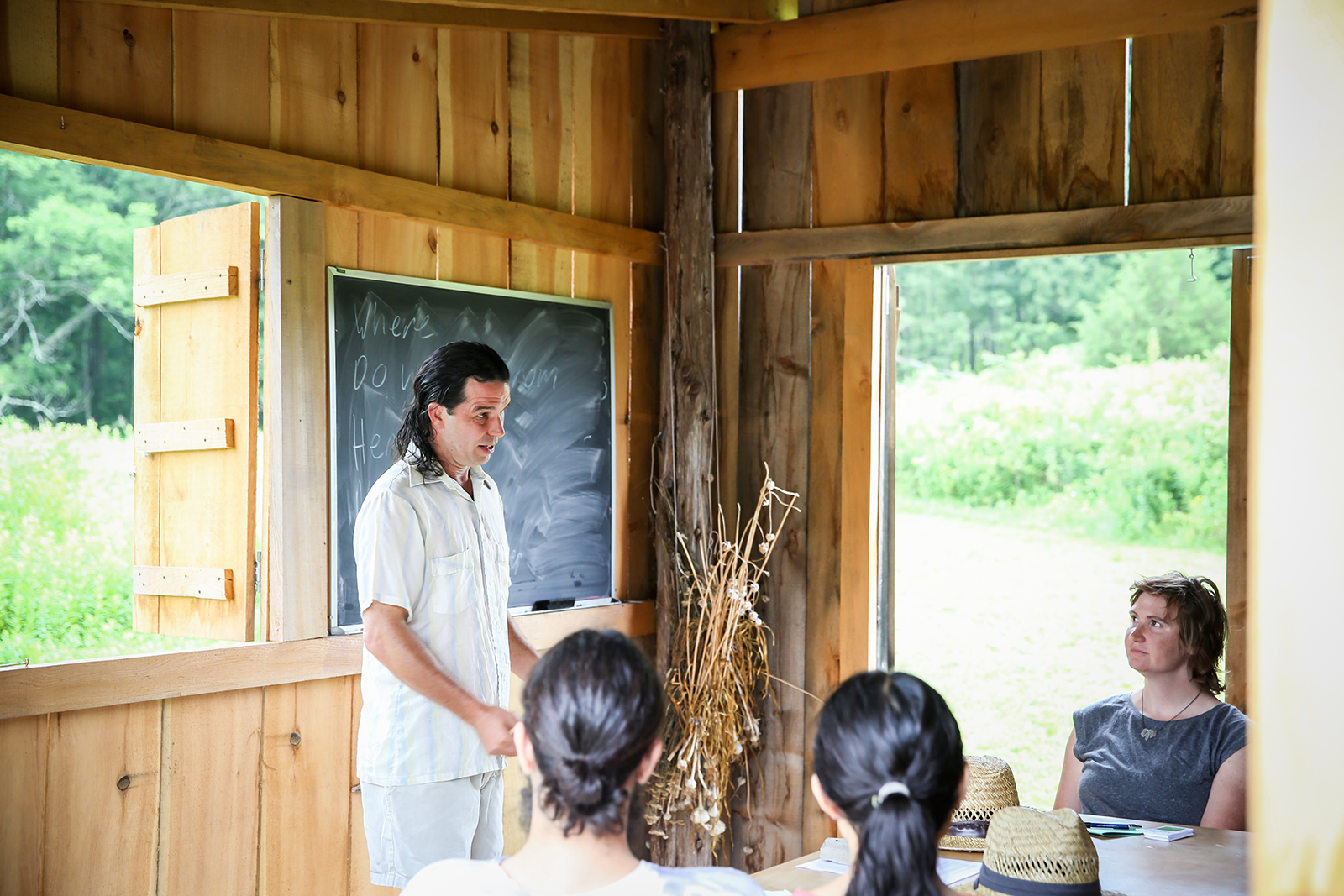When permaculture consultant Andrew Faust, 51, made the decision 18 years ago to move off the grid in Pocahontas County, W.Va., he challenged himself to live off the land, which he did for eight years, with the goal of expanding his knowledge. People’s relationship with nature fascinated him, and he began to build things with his hands. He also started learning about permaculture, an ecological model that focuses on region-specific environments, and biodynamic farms. The more he learned and the more experience he gained, the more he wanted to educate others about how to live a more self-sufficient and sustainable lifestyle. “If you throw yourself a little farther out but not that much farther out, you get some interesting understandings that you don’t get if you always stay in the comfy bosom of industrial civilization,” Faust says. After doing his research, Faust built a 1600-square-foot straw bale house in the middle of a field, started growing his own produce, and relied on natural resources like the sun for power. He calls it his “Permaculture Ph.D. project.”

Faust’s project helped inform the work he does today as a permaculture expert and designer. In this role, he has taught backyard gardeners and homesteaders in New York City how to find, develop, and live off their land using natural ecosystems they design for almost two decades. “The version of homesteading that permaculture pursues is a lot more of a hybrid of modernity than with back to the land,” says Faust about his homesteading philosophy. “I think it’s cool to pick certain things that you like doing and to make that what you’re self-reliant in.”
Before moving off-grid, Faust taught ecology and forestry classes from 1992 to 2001 at Upattinas Open Community High School, a former alternative school in Glenmoore, Penn. and his alma mater (he graduated in 1986). Working on his off-grid homestead served as an opportunity for Faust to launch Center for BioRegional Living, his permaculture consultancy business. As he developed his homestead, he planned and designed houses, farms, gardens, and retreats for numerous clients with natural materials, regional climate and landscapes, and native plants and animals in mind. For example, he redesigned the property of Gesundheit Institute, a nonprofit organization that offers vacation retreats, holistic wellness workshops, and land-based educational programs on 325 acres of land in Hillsboro, W.Va. He planted more than 100 different fruit trees, prepared their land for small-scale agriculture, and constructed a compost system.
In 2007, Faust moved to Brooklyn, N.Y. to set out on a new challenge: Taking what he knew about ecology and applying it to designing urban landscapes and homesteads. “The homestead is a transformative tool by which you gain skills and self-awareness that enable you to re-engage with mainstream society in a way that’s actually now more meaningful and more transformative because you’ve gained some insights about how to heal civilization,” Faust says. He started teaching earth-friendly courses that brought permaculture and urban homesteading together such as growing organic fruit and vegetable gardens indoors, using passive solar energy systems, and building a biogas generator.
It’s not just nuts and bolts about how many acres of potatoes you have or how much acreage you need to be food self-sufficient.
Along the way, he also developed a permaculture design certificate program for people interested in sustainable approaches to developing city spaces and cultivating urban ecosystems. Since its creation, Faust has graduated more than 500 people, many of whom have launched their own businesses on permaculture or who sell natural products. Today, Faust also hosts workshops, classes, and events from his off-grid home located on a 14-acre field in Ellenville, N.Y. There, Faust and his apprentices practice what they learn — from building an outhouse with a urine separation system to rotationally grazing laying hens out in the pasture.
And despite the classes and workshops that keep Faust busy, he still finds time to work on his book, Earth is our Home, where he outlines how to create localized economies by applying homesteading methods such as composting, growing organic food, and using natural resources on a regional scale. He also actively lectures on permaculture across the country, such as his TedX talk on ecological models in Schenectady, N.Y. But in between teaching classes that seek to educate people about permaculture, Faust agreed to field questions and offer advice on factors to consider when considering becoming a homesteader, the role of a personal-skills inventory, the most underrated step in transitioning to a homesteading lifestyle, and a key factor that just might keep you from becoming Jack Nicholson in The Shining.
Rooted: Why did you want to teach homesteading and permaculture?
Faust: I wanted to teach people things about how to live more comfortably in a way that was natural and reasonably accessible. How much can you do with just people, power, and hand tools were part of my pursuit with homesteading or to learn how to live in a way that cuts out reliance on all kinds of things that you just have at your fingertips when you’re in a more connected part of the landscape that has the grid and the things that people have grown accustomed to.
Rooted: What’s something people should know before they dive into homesteading?
Faust: I would definitely, as I started out, emphasize thinking a lot about what their goals are and point them to permaculture. For me, it’s like a guidebook to a solid approach to homesteading, which you’re only going to really find in permaculture. And what I mean by that is the things about energy systems, building systems, gardening, animals.
Rooted: How do you identify and articulate homesteading goals while connecting them to permaculture?
Faust: I first ask people to tell me what their full-fledged vision for the project is. I start out with a conversation about that: What are their goals, what’s the history of their experience on the property, how long have they owned it, what do they want to do there. Right now, I’m doing a consultation for a client just outside of New Paltz on Route 219. They bought the property, and it’s on a north-facing slope and had a lot of trees on the south side of the house. They told me their goals were to grow some vegetables, teach some Korean farming classes, and grow some fruit trees. I said, well, you’re not going to be able to do this on the north-facing slope with a bunch of trees towering to the south of your house, so you should take them down. And as soon as they did, their gardens did great. The air and the light around the building are much improved. So classically, what I’m telling people is how to open up their properties to better sunlight and how to get places better drainage, air quality, and airflow.

Rooted: What sort of skills should a person interested in a permaculture-designed homestead have? And how do you suggest them taking a personal skills inventory?
Faust: Permaculture takes on the whole ball of wax, which can be a little intimidating. How about becoming a generalist and learning a little bit of carpentry and basic electrical and plumbing skills so that you can fix a lot of the easy stuff that may break on a farm? Also, one of the basic skills that I’d say is the most useful would be being a good grower. And when you decide to become more self-reliant, get some skills in renewable energy and home construction.
Rooted: Any advice on how to test your green thumb before buying the farm?
Faust: As far as being a farmer, gardener, or grower, test a year and see your own sensibilities about that. I would also say there are a lot of options in the Northeast and other parts of the country to only develop certain aspects of your homestead skills. It’s a good idea, if you can, to rent a place in an area you’re considering moving to and buying land in. If people have that option to rent a place for a month or two or a season, that can be a really good process for people to vet out regions and be sure they’re landing in the right spot for putting this much sweat equity into a parcel. It doesn’t take a lot of capital and a learning curve to achieve good results.
Rooted: What advice would you give someone looking to purchase land for a homestead?
Faust: The first thing that’s important in homesteading is the right property in the right place for the right price. It’s no different than any other real estate activity except you fine-tune it with a lens of the goal to homestead. I recommend making a list of values they have and what they’re looking for — at least three to five key points that are a distillation of their goals. Not so much just randomly looking at parcels of real estate than saying more specifically, we know we want something that’s three to five acres. We know we want to have some kind of small farm on it. We know we’d like to raise animals and grow some food. We want to be self-reliant year-round in a climate where we can grow nut and fruit trees, and we want to live near a community of people who are like-minded. That way, you’ve already narrowed down the time you’re spending just looking at different listings. Also, just looking at maps and doing research on things like water quality, air quality, and pollution sites. And I will say if people are going to homestead and are thinking about raising a family, an obvious one but sometimes not looked at carefully is schooling.
Rooted: What kind of property should you look for when starting a homestead?
Faust: I definitely recommend staying away from flood plains that are in a larger river valley or land that is close to the stem of a larger river. The likelihood that you’re going to have problems with flooding is a lot higher, and generally, you’re more prone to mold and blight. It’s a frost pocket as well. Stay higher in the landscape and have a good balance in acreage. You don’t want whole forested sites. You can’t really garden in the woods, so you want to have a nice amount of meadow. Also, an all-forested landscape is a poor choice in cold climates. If you buy property that’s all woods, you’re going to be spending a lot of money clearing it in order to have a place where you can even build, which doesn’t make sense. If I had to make the choice, I’d rather have more meadow than forest. If you really want to do some degree of self-sufficiency when it comes to food and other activities like growing fruit or nut trees, you’re going to want sunlight. You also want property that’s well drained.
Rooted: You seem to gravitate to the Northeast. Any reason why?
Faust: Part of the beauty of most of the Northeast and why it’s easier to homestead here is that we get a good balance of rainfall. You can basically do what’s called rainfed agriculture here; there’s very little need to irrigate. Whereas other areas of the country, you’re going to need to do a lot with thinking about rainwater catchment and xeriscaping.
Rooted: What are some common mistakes people make when buying land for homesteading?
Faust: An illusion that city people sometimes have is that buying something because it’s cheap is a good idea. Then, I walk in and look at it, and sometimes they buy something that’s going to cost them a lot to even make it buildable and that’s part of why it wasn’t as expensive as the nicer parcel that has a better balance to it.
Rooted: Beyond price, what are other things to consider?
Faust: You want to do a good site analysis for wherever you’re going to homestead so that you know something about the climate, topography, water quality, air quality. Like I did a consultation for some clients who bought land in Millerton, which is right on the base of the Berkshire Mountains. They thought they had this totally sweet piece, and it was in a lot of ways, but when I looked up the air quality there, it was really low. They were quite upset with me for telling them that, and I said, this is all available online. It was an EPA database on airshed ranking. There’s a lot of online data — use it. Most people don’t. They just sort of look at property values, school taxes, resale values.
Rooted: You suggest doing your homework about the land and the terrain. What are some of the other things to consider and why?
Faust: The reality of homesteading is it’s a lot of sweat equity that you’re investing. You don’t want to end up frustrated, burned out, and demoralized, and have nobody to celebrate the successes with. So I think being near a college town or some cluster of like-minded people is good. And thinking a lot about where you’re going to homestead is, I think, an underrated part of the process. It’s not just nuts and bolts about how many acres of potatoes you have or how much acreage you need to be food self-sufficient. What’s way more important is did you land the plane in a place that you’re going to be happy in, slogging in that journey. That’s a lot of what I learned by living way out in the middle of nowhere. And winter can get intense. All of a sudden, The Shining is like your reality in the winter.

